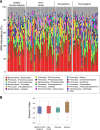Alterations in Intestinal Microbiota Correlate With Susceptibility to Type 1 Diabetes
- PMID: 26068542
- PMCID: PMC4587635
- DOI: 10.2337/db14-1847
Alterations in Intestinal Microbiota Correlate With Susceptibility to Type 1 Diabetes
Abstract
We tested the hypothesis that alterations in the intestinal microbiota are linked with the progression of type 1 diabetes (T1D). Herein, we present results from a study performed in subjects with islet autoimmunity living in the U.S. High-throughput sequencing of bacterial 16S rRNA genes and adjustment for sex, age, autoantibody presence, and HLA indicated that the gut microbiomes of seropositive subjects differed from those of autoantibody-free first-degree relatives (FDRs) in the abundance of four taxa. Furthermore, subjects with autoantibodies, seronegative FDRs, and new-onset patients had different levels of the Firmicutes genera Lactobacillus and Staphylococcus compared with healthy control subjects with no family history of autoimmunity. Further analysis revealed trends toward increased and reduced abundances of the Bacteroidetes genera Bacteroides and Prevotella, respectively, in seropositive subjects with multiple versus one autoantibody. Canonical discriminant analysis suggested that the gut microbiomes of autoantibody-positive individuals and seronegative FDRs clustered together but separate from those of new-onset patients and unrelated healthy control subjects. Finally, no differences in biodiversity were evident in seropositive versus seronegative FDRs. These observations suggest that altered intestinal microbiota may be associated with disease susceptibility.
© 2015 by the American Diabetes Association. Readers may use this article as long as the work is properly cited, the use is educational and not for profit, and the work is not altered.
Figures



Comment in
-
Comment on Alkanani et al. Alterations in Intestinal Microbiota Correlate With Susceptibility to Type 1 Diabetes. Diabetes 2015;64:3510-3520.Diabetes. 2015 Oct;64(10):e40. doi: 10.2337/db15-0848. Diabetes. 2015. PMID: 26405281 No abstract available.
-
Response to Comment on Alkanani et al. Alterations in Intestinal Microbiota Correlate With Susceptibility to Type 1 Diabetes. Diabetes 2015;64:3510-3520.Diabetes. 2015 Oct;64(10):e41. doi: 10.2337/dbi15-0009. Diabetes. 2015. PMID: 26405282 No abstract available.
Similar articles
-
Imbalance of bacteriome profiles within the Finnish Diabetes Prediction and Prevention study: Parallel use of 16S profiling and virome sequencing in stool samples from children with islet autoimmunity and matched controls.Pediatr Diabetes. 2017 Nov;18(7):588-598. doi: 10.1111/pedi.12468. Epub 2016 Nov 17. Pediatr Diabetes. 2017. PMID: 27860030
-
Compromised gut microbiota networks in children with anti-islet cell autoimmunity.Diabetes. 2014 Jun;63(6):2006-14. doi: 10.2337/db13-1676. Epub 2014 Mar 7. Diabetes. 2014. PMID: 24608442
-
Toward defining the autoimmune microbiome for type 1 diabetes.ISME J. 2011 Jan;5(1):82-91. doi: 10.1038/ismej.2010.92. Epub 2010 Jul 8. ISME J. 2011. PMID: 20613793 Free PMC article.
-
The Role of the Intestinal Microbiome in Type 1 Diabetes Pathogenesis.Curr Diab Rep. 2016 Oct;16(10):89. doi: 10.1007/s11892-016-0781-z. Curr Diab Rep. 2016. PMID: 27523648 Review.
-
Is there a role for gut microbiota in type 1 diabetes pathogenesis?Ann Med. 2017 Feb;49(1):11-22. doi: 10.1080/07853890.2016.1222449. Epub 2016 Nov 29. Ann Med. 2017. PMID: 27499366 Review.
Cited by
-
Unravelling the Role of Gut and Oral Microbiota in the Pediatric Population with Type 1 Diabetes Mellitus.Int J Mol Sci. 2024 Oct 2;25(19):10611. doi: 10.3390/ijms251910611. Int J Mol Sci. 2024. PMID: 39408940 Free PMC article. Review.
-
Investigating the Interplay: Periodontal Disease and Type 1 Diabetes Mellitus-A Comprehensive Review of Clinical Studies.Int J Mol Sci. 2024 Jul 2;25(13):7299. doi: 10.3390/ijms25137299. Int J Mol Sci. 2024. PMID: 39000406 Free PMC article. Review.
-
Influence of Maqian essential oil on gut microbiota and immunoresponses in type 1 diabetes: In silico study.Heliyon. 2024 Apr 15;10(8):e29490. doi: 10.1016/j.heliyon.2024.e29490. eCollection 2024 Apr 30. Heliyon. 2024. PMID: 38655301 Free PMC article.
-
Dietary emulsifier consumption accelerates type 1 diabetes development in NOD mice.NPJ Biofilms Microbiomes. 2024 Jan 6;10(1):1. doi: 10.1038/s41522-023-00475-4. NPJ Biofilms Microbiomes. 2024. PMID: 38182615 Free PMC article.
-
Metabolic Syndrome: A Narrative Review from the Oxidative Stress to the Management of Related Diseases.Antioxidants (Basel). 2023 Dec 8;12(12):2091. doi: 10.3390/antiox12122091. Antioxidants (Basel). 2023. PMID: 38136211 Free PMC article. Review.
References
-
- Gianani R, Eisenbarth GS. The stages of type 1A diabetes: 2005. Immunol Rev 2005;204:232–249 - PubMed
Publication types
MeSH terms
Substances
Grants and funding
LinkOut - more resources
Full Text Sources
Other Literature Sources
Medical
Research Materials

